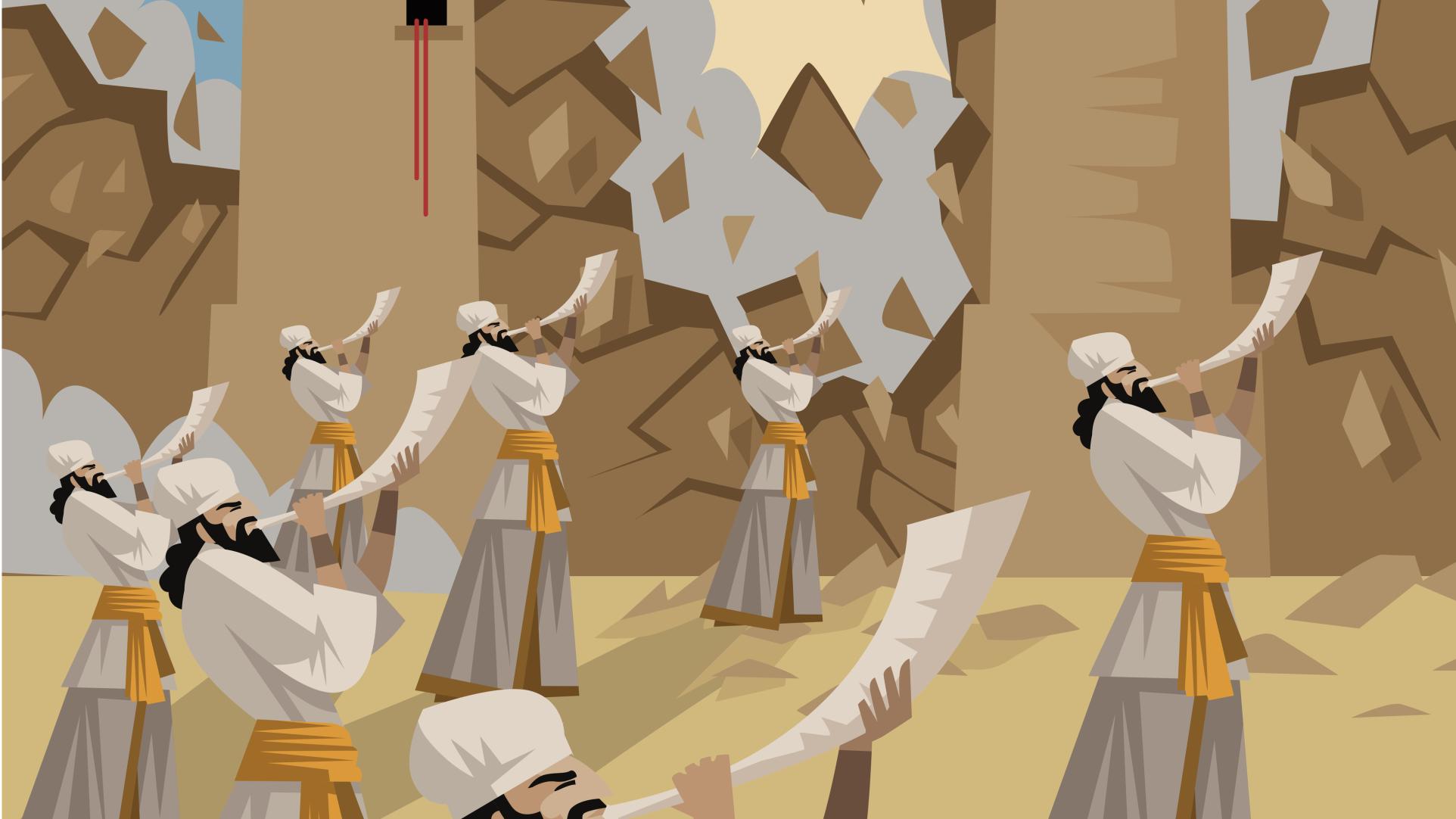Children of Israel's Equipping Process for Victory
After their forty-year wilderness sojourn, the Hebrew nation was yet again on the threshold of entering the land endowed to Abraham and his descendants. Moses had passed to his rest at the summit of Mount Nebo, so Joshua would lead the twelve tribes to their new lives in the Promised Land. God assured His self-distrusting leader: “As I was with Moses, so I will be with you. I will not leave you nor forsake you” (Joshua 1:5).
With God's assurance, Joshua's fears abated. The Supreme Leader then counseled Joshua: “Be strong and of good courage, for to this people you shall divide as an inheritance the land which I swore to their fathers to give them” (Joshua 1:6).
Joshua knew that battles to conquer the land were in their future before they could inhabit their new homes. Jericho, a substantial and heavily buttressed city, rose above the countryside just beyond the Jordan River. It was the gateway to all of Canaan, and it would be the first city to be overthrown.
The roaming nation was camped on the Jordan's east side, and Jericho was to the west. Joshua sent two spies to the city to scope out the land and its possibilities. The young men were in grave danger because the city's citizens were on high alert. These people of the plain knew the history of miracles that the wilderness wanderers had enjoyed. To have that throng of people essentially next door terrified them, so they stepped up their security systems.
Not long after the spies set foot inside the fortress, the sentinel guards briefed the king of Jericho that they had entered within the city gates. God, however, protected the two and used them to win the soul of a lady of the evening: Rahab. After making arrangements to save her and anyone under her roof, the two men returned to camp with a good report.
The first order of business, however, was to cross the raging torrents of the Jordan River. The nomadic nation, following God's commands, prepared to go forward. They were to make ready a three-day supply of food, and the army was to gird for battle.
Three days later, they navigated the raging waters, again on dry land. Instead of Moses’ rod stretched over the water, this time the priests had to step their feet into the chilly melted snow before the waters parted for the people to tread the riverbed.
The citizens of Jericho witnessed firsthand a miracle of the Power that led these itinerant people. With the Israelites camped on their doorstep, the people of the walled city shuttered with great fear, even though their fortress seemed impenetrable.
Joshua, eager to know how God would have him move forward, retreated to seek the Lord’s direction. When God opened to Joshua's eyes as to how the city would be overcome, He pronounced, “See! I have given Jericho into your hand, its king, and the mighty men of valor” (Joshua 6:2). The victory was already theirs, and the plan in place would give glory to God.
In obedience to the divine command Joshua marshaled the armies of Israel. No assault was to be made. They were simply to make the circuit of the city, bearing the ark of God and blowing upon trumpets. First came the warriors, a body of chosen men, not now to conquer by their own skill and prowess, but by obedience to the directions given them from God. Seven priests with trumpets followed. Then the ark of God, surrounded by a halo of divine glory, was borne by priests clad in the dress denoting their sacred office. The army of Israel followed, each tribe under its standard. Such was the procession that compassed the doomed city.1
For six days, the people of Jericho witnessed a most peculiar display. No battle cries, no thrust of weapons — only the sound of soldiers’ feet marching and the mournful resonance of the trumpets pierced the air. The inhabitants of the city quivered even more as they observed this abnormal battle behavior. Furthermore, as the children of Israel beheld the strategy of God unfold, their faith grew. They had just miraculously crossed the Jordan River, now they were party to a parade of Power. “It was to be impressed upon their minds that their strength was not in the wisdom of man, nor in his might, but only in the God of their salvation.”2

The seventh day, however, was even more distinct than the previous six. The quiet company did not disperse after encircling the walled city just once; seven times they encompassed the fortification. With each passing, the fear of the people in the enclosure escalated into a frenzied state.
Suddenly, a blast came from the trumpets so strong that the earth trembled. The indomitable towers crumbled and fell. The Israelites shouted glory to God, went into the city, and possessed it. “By faith the walls of Jericho fell down after they were encircled for seven days” (Hebrews 11:30).
Failure at Ai
God had covenanted with Abraham that He would make of him a great nation more than 400 years before they set foot in the Jordan River (see Genesis 12:2; Galatians 3:17). Joshua knew that they were to go throughout the land of Canaan, conquering and claiming it as their own, for it was the land of promise.
Thus, after the success at Jericho, he led the people similarly to conquer Ai, which was a smaller city a few miles distant. Again, he sent spies to examine the need, and their report was that the city could easily be taken with an army of fewer men. They had become so self-confident because of the victory at Jericho that they thought they could go forward themselves. However, they, including Joshua, neglected to consult their all-knowing Leader. Taking 3,000 soldiers, they went into battle, expecting an easy conquest. They met with a resounding defeat, and thirty-six of the men lay on the battlefield, slain by the Canaanites.
Joshua was devastated. He and the leaders of Israel fell prostrate before the Lord. “Then Joshua tore his clothes, and fell to the earth on his face before the ark of the Lord until evening, he and the elders of Israel; and they put dust on their heads” (Joshua 7:6).
Had they consulted with God before they went to battle, they would have known that there was sin in the camp. Once God revealed the transgression, they moved forward in cleansing themselves and the people of the egregious error that poisoned the entire congregation. Through a series of several steps, Achan was discovered to be the culprit. The camp was cleansed of Achan, his family, and even his livestock and tent (see Joshua 7:16–26).
Achan would have done well to remember the counsel that Moses gave to the tribes of Reuben and Gad when they wanted to settle east of the Jordan River before the forty years of traipsing over unknown trails was complete: “…and be sure your sin will find you out” (Numbers 32:23).
Our Calling
God has a plan for each one of us. “For I know the plans I have for you, declares the Lord, plans for welfare and not for evil, to give you a future and a hope” (Jeremiah 29:11 ESV). Like the children of Israel, we are wandering in the wilderness, the wilderness of sin, which is far removed from God’s design.
Of the millions of Hebrew people, only Achan was disobedient. This principle is the same with us. What appears as one tiny, seemingly insignificant sin pollutes our entire beings. We can be 99.99 percent pure, but that 0.01 percent affects us profoundly. That 0.01 percent of sin is what holds us back. If that is not purged from our lives, we will suffer the same fate as Achan. In eradicating sin from our lives, we must confess it. First John 1:9 is a promise from God: “If we confess our sins, He is faithful and just to forgive us our sins and to cleanse us from all unrighteousness.” The power in Jesus’ shed blood for us cleans us thoroughly: “Though your sins are like scarlet, they shall be as white as snow; though they are red like crimson, they shall be as wool” (Isaiah 1:18).
Once sin is expunged from the universe, that 0.01 percent will be eradicated for eternity. If we do not deal with the error that taints our lives, no matter how inconsequential it may seem, we will be separated from God for eternity. The distress of sin, once eliminated, will never afflict the heavenly realm again (see Nahum 1:9).
Call to Action
Many have compared the removal of sin to surgery because carving out the disease is excruciatingly painful. Are you willing to endure the agony of removing even 0.01 percent of sin from your life? If so, drop to your knees, confessing your offenses before God. You are promised forgiveness. If you do not know the specifics of your sin, plead with Him to reveal it to you (see Psalm 139:23-24). With mercy, He will show it to your penitent heart so that you can surrender it and be covered with Christ’s atoning blood.
Unless otherwise noted, all scripture taken from the New King
James Version®. Copyright © 1982 by Thomas Nelson. Used by permission. All
rights reserved.
- Ellen G. White, Patriarchs and Prophets (Washington, D.C.: Review and Herald Publishing Association, 1890), 488.
- Ibid., 493.




